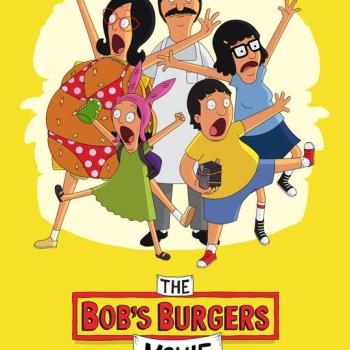Review of Rebecca, directed by Alfred Hitchcock
By PAUL D. MILLER
Rebecca (1940) is a creepy film. From the opening shot of trees in the mist to a key sequence in the fog to the closing shot of a mansion engulfed in smoke, the film is pervaded with wisps of the gray stuff, a visual analog to the murkiness of the world in which it takes place. Unease and anxiety build through almost three-quarters of the film—without any clear reason why. There isn’t even a living antagonist until the very end.
The atmosphere of dread, foreboding, and suspense was the specialty of the man behind Rebecca, of one of cinema’s great masters: Alfred Hitchcock. Hitchcock is probably best known for Psycho (1960), one of the (weirdest) landmarks of cinema, and for other works, like North by Northwest (1959) and Vertigo (1958) (which made news this year when it was voted the greatest film of all time in the British Film Institute’s Sight and Sound Poll, unseating Orson Welles’ Citizen Kane for the first time in five decades).
Rebecca does not appear on the BFI list of greatest movies, or the AFI list (it is #123 on IMDB.com’s list). But Rebecca was the only Hitchcock film to win the Oscar for Best Picture. (Hitchcock himself never won for Best Director, despite five nominations.) I don’t know that it really deserved to win over The Philadelphia Story, but I think there is a reason why it was recognized by its contemporaries when other Hitchcock masterpieces were not: Rebecca is Hitchcock at his most restrained. It has none of the gore of The Birds (1963) or the spy-thriller mystique of North by Northwest, and it has far more down-to-earth and believable psychological tension than Vertigo or Psycho. The latter two films are frankly bizarre tales of murder, suicide, and psychological torture, while Rebecca is, for the most part, populated with sane humans. In that sense it has more in common tonally with Rear Window (1954) than with Hitchcock’s more famous later works.
Rebecca tells the story of an unnamed protagonist who meets and falls for a wealthy widower, Maxim de Winter. Maxim is apparently still grieving the loss of his wife, the eponymous Rebecca, who is said to have drowned in a boating accident. Nonetheless, Maxim falls in love with and promptly marries our protagonist, who becomes the second Mrs. de Winter. But her new life is overshadowed by the memory of the late Rebecca, who, she realizes, had come to dominate the mansion and the servants there. The second Mrs. de Winter begins to doubt she will ever break free of Rebecca.
The plot summary sounds quite dull, and, in fact, very little happens for most of the movie. Yet it is hard to overstate how unsettling it is. Hitchcock and his cinematographer (who did win an Oscar) fill this ‘uneventful’ story with very intense feelings of unease and dread. This carries on for fully three-quarters of the film.
I wondered if the building tension would lead anywhere, given the apparent lack of material with which to craft an interesting ending. Hitchcock delivers with twist piled on twist. Maxim reveals that [SPOILER ALERT!] Rebecca was not the model wife posthumous stories made her out to be; she merely played that role as a game while contemptuously indulging in multiple affairs at will. Maxim confesses that Rebecca did not accidentally drown: she died in a struggle with Maxim, trying to provoke him into killing her in a fit of rage and jealousy after she confessed to carrying someone else’s child. (Instead of showing these events in a flashback, Maxim narrates while the camera dwells on empty spaces where Rebecca had sat or stood, a brilliant choice that forces the reader to imagine her terrible beauty and mocking laughter—always more effective than simply showing it).
But that is not the end. We finally learn that Rebecca was never pregnant in the first place. She had terminal cancer and was going to die very soon. Her last act was to invent a pregnancy solely to drive Maxim mad and either provoke him into killing her or frame him for her own death.
Rebecca was driven by a singular desire to squeeze as much pleasure out of life as possible. She abided by moral and social conventions only as much as was necessary to marry rich, at which point she (we are told) left no pleasure un-tasted. When her own looming death was announced, her response was not sorrow, but immature, petty malice. She struck out in hateful spite against the person who most represented the moral order she hated: her husband. Rebecca faced a reckoning, and she plunged into it hoping to bring down ruin around her as she fell.
I am reminded of Ahab’s death-cry against Moby Dick: “To the last I grapple with thee; from hell’s heart I stab at thee; for hate’s sake I spit my last breath at thee.” And, also, of Jesus’ warning: “Whoever would save his life would lose it…What does it profit a man to gain the whole world and forfeit his soul? For what can a man give in return for his soul?” The worship of the self can only lead to the destruction of its object.
Such people do exist. They fascinate us because they are completely devoted to themselves and their own pleasures, and seek to dominate everyone and everything around them. We are tempted sometimes to admire their strength of will and devotion of purpose. In Rebecca, Maxim’s housekeeper, Danvers, does just this. She is in such thrall to the memory of Rebecca that she would rather the mansion burn than see another Mrs. de Winter rule it. Spite, like all sin, is contagious, ruinous, and enslaving. Such is the way of false gods.












